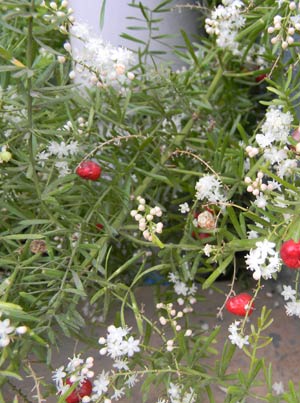
Taken from ‘The Ayurveda Bible’ by Anne McIntyre
For the first of our ‘Spotlight on Herbs’ blog posts I’ve chosen Shatavari. This herb is an excellent nourishing tonic and the most important Sattvic rejuvenative for women – hence the name which translates as ‘she who possesses a hundred husbands‘! It is cooling and moistening, restoring balance when the body and mind are overheated and depleted, soothing dry and inflamed mucous membranes in the respiratory tract, kidneys, stomach and sexual organs. It balances female hormones, increases fertility, relieves PMS, menstrual and menopausal problems and low libido, and increases milk supply during lactation.
Shatavari cools and soothes inflammatory problems in the digestive tract including acid indigestion, gastritis, peptic ulcers, inflammatory bowel problems such as Crohn’s disease and ulcerative colitis and, with its thirst relieving and fluid protecting powers, is good for chronic diarrhoea and dysentery. Soothing and cooling for cystitis, it dissolves stones and gravel and reduces fluid retention.
With its adaptogenic properties, shatavari enhances immunity, growth and development in babies and children. It stimulates white blood cells, helping to fight infection, and is a good antifungal for candida and thrush, antibacterial against a range of bacteria including salmonella, E coli and pseudomonas and antiviral against herpes. It protects blood-producing cells in the bone marrow, aiding recovery after exposure to toxic chemicals. It is a good remedy for convalescence and is anti-inflammatory for gout and arthritis.
Shatavari has an affinity for the mind and is used to promote memory and mental clarity, and for ADHD in children, often combined with brain tonics such as gotu kola. It is calming, reduces anxiety and increases resilience to stress.
Externally, as an ingredient of Mahanaryan oil, it is used to reduce the development of scar tissue after surgery. It soothes the skin and eases Vata problems, including stiff and painful joints, stiff neck and muscle spasms.
Cautions: Avoid with high Kapha, low Agni, Ama and catarrh.
Part used: root
Quality: heavy, unctuous
Taste: sweet, bitter
Potency: cooling
Post-digestive: sweet
Dosha: VP- K+ (in excess)
Dhatu: all
Srota: digestive, female reproductive, respiratory
Actions: Nutritive tonic, rejuvenative, galactogogue, adaptogenic, antispasmodic, nervine, anti-inflammatory, demulcent, refrigerant, diuretic, aphrodisiac, expectorant, antibacterial, alterative, antitumour, antacid, antidiarrhoetic.
